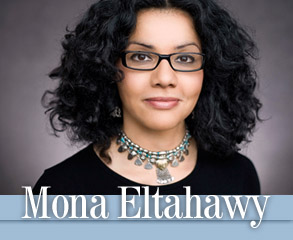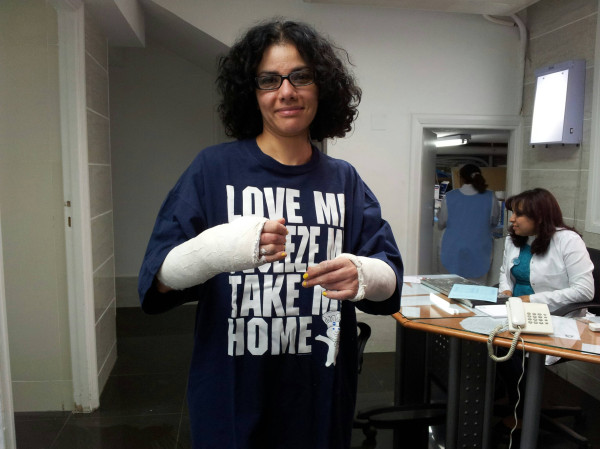Beantwortet furchtlos wie immer die großartige Mona Eltahawy, die auch sonst viel Erhellendes über die Schwierigkeit zu sagen weiß, wie man als Feministin und Muslima mit den Widersprüchen des eigenen Glaubens lebt. Eltahawy hat selbst 9 Jahre lang Kopftuch getragen, als sie in Saudi Arabien lebte. Heute sagt sie: „Lasst gefälligst mein Haar in Ruhe!“ Hier spricht sie mit Rachael Kohn von ABC Radio:
Rachael Kohn: Do you think that feminism has much of a chance in the Muslim world? I know you’ve written about women in Khartoum who have been arrested for wearing baggy pants or others who have been flogged for alleged indecencies. Do you think that in the Muslim world feminism will take hold, either secular or religiously-based feminism?

Mona Eltahawy:I became a feminist when I was 19 and living in Saudi Arabia, simply because I despaired of what I could see as men copyrighting religion because this is not the Islam that I was taught. So I became a feminist basically to keep my mind, keep my wits together, but also because I became familiar with many Muslim women who were writing about religion, and Muslim women scholars. So this was when I was19 back in the late ’80s.
Since then, I have come across many more Muslim women who are reinterpreting their religion, who are rolling up their sleeves and saying ‚This is our fight, and we’re no longer going to give in to the male interpretations of the religion.‘ And as a Muslim woman, I fully believe that all those awful violations that are committed against women, supposedly in the name of religion and in the name of Islam, are committed and justified because of the male domination in the fields of interpretation and religious scholarship generally.
The future I think for Islam, belongs to women because quite simply, we have nothing to lose. For too long men have controlled the interpretation of the religion and men have told us what God wants from us, and for me as a Muslim the whole point of Islam and what makes it special for me and why I remain a Muslim is that it’s my direct relationship with God. Nobody, especially a man, should be there between me and God.
So whether you’re talking about Sudan or whether you’re talking about here in the US where we as Muslims live as a minority, it’s women who are leading the way, and here in the US especially, I think of Amina Wadud who is a scholar of Islam with tremendous academic credentials and scholarship behind her, who led us in the first public Friday prayer led by a woman of a mixed-gender congregation. This was here in New York in 2005. There were 50 men and 50 women praying side by side, and to this day, everywhere I travel people either ask me about it or remember something I wrote about it, and are still stunned and for many, still inspired by this woman who basically said, ‚I am going to be an imam. I want to be an imam and I’m no longer going to wait for anyone’s permission.‘
It has since inspired so many other women to lead prayers, has inspired other congregations to ask women to lead prayers, and you know, if you look at my bookshelves here, I have books by women like Asma Balas, Leila Ahmed, Fatima Mernissi, you know, show me the others who are doing exactly the kind of work that secular feminists and Muslim feminists need so that we can argue back and say, ‚Islam does not belong to men. Islam belongs to human beings.‘
Rachael Kohn: And is that mixed congregation still going?
Mona Eltahawy:In many places it is. It depends. You know, after Amina led the prayer, it was co-sponsored by a movement I belonged to at the time which is no longer in place, but has inspired others. So there’s one group for example called Muslims for Progressive Values that was a spin-off of that, women in the movement still lead mixed-gender prayers. I know many congregations in Canada have asked women to lead their prayers. Amina herself has led mixed-gender prayers in the UK and at a feminist conference in Barcelona. I don’t know of other places where this has happened but I know that it has taken off since the 2005 prayer.
Rachael Kohn: Well that seems to be a very courageous step, and I wonder how risky it is. For example, when you wrote in one of your articles that you agreed with the French President, Nicolas Sarkozy when he says the burqa is not a religious sign but a sign of the subjugation of women. How risky is it for you to make those kind of statements, particularly when for many Muslims, Islam means submission and therefore women should submit?
Mona Eltahawy:I think for the majority of Muslims, Islam should be in submission to God, not submission to a man. And my argument on the burqa I recognise has been very controversial, but I think that it is one of these things that has fallen into many traps.
One is cultural relativism, another is political correctness, another is what has happened to Muslims who have emigrated to various parts of the West, and the discrimination and bigotry they face from the growing right-wing in those countries. As far as I’m concerned, the burqa and the niqab, face veils of any kind, do not belong to Islam, they’re much more a tribal expression that is very specific to the Arabian Peninsula, specifically Saudi Arabia and its very ultra Orthodox interpretation of Islam, commonly known as Wahabi or Salafi Islam. This is where the face veil comes from.
I want to ban the niqab and the burqa everywhere, including in Saudi Arabia. But when it comes to Europe especially and when it comes to Sarkozy’s comment, I think what happened there is that because Muslims in France, you know the largest Muslim community in Western Europe, have faced a lot of discrimination, and the right-wing in Europe have become very vocal, many people who are horrified by the burqa and the niqab refused to say anything because they worry they’re going to arm and fuel the political right-wing. But my point is that in order to defend women, I will not sacrifice women and women’s rights for political correctness, because my enemy is not just the political right-wing in Europe, but what I call the Muslim Right Wing, and that is Salafi-Wahabi Islam.
So I position myself very much in the middle between people like Le Pen in France, the British National Party in the UK, all the other right-wing expressions of politics in Europe, but also all those men who for me represent the Muslim right-wing, who are very happy to tell women how they should look and how they should dress, and are specially obsessed with women’s appearance. So I’m not going to defend Salafi-Wahabi Islam which you know in France anyway you know, a tiny minority of women cover their face, that I recognise, but it represents something, it represents the erasure of women and it represents a hateful ideology because when you unpack Salafi-Wahabi Islam it is hateful towards women, and there is no way I’m going to defend that just so that I can speak out against the right wing. We must speak out against both right-wings. Weiter„Warum ein Burkaverbot richtig ist“



